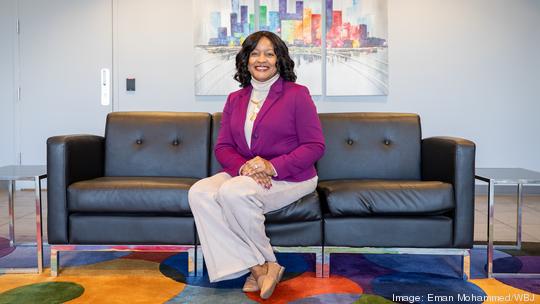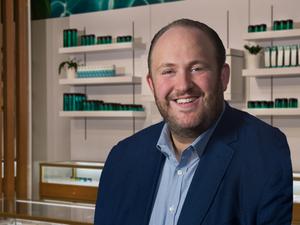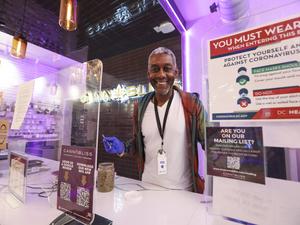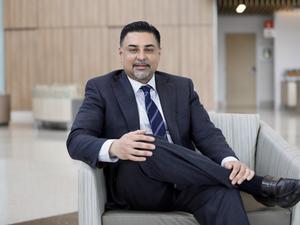
Susan Mitchell wants to support life sciences and biotechnology companies just starting out.
But that’s just one piece of the vision for her business, Athari BioSciences Inc., which she’s been working to build up since August — as, ultimately, an engine for eliminating inequities in the industry.
And progress is happening fast, she said in a recent interview. “We’re really excited about the trajectory and the quick pace with which we’ve been able to get everything underway,” she said.
‘Fill those gaps’
Mitchell, a woman of color, jumped into biotech without much direct training in science.
But she’s an entrepreneur, president and CEO of D.C. government contractor Guardians of Honor, which provides grants management, research evaluation and technical assistance to a range of clients including the National Science Foundation, Department of Education, National Institutes of Health and others. And that work has included supporting programs to draw women and minorities to science, technology, engineering, math and medicine. “The passion just kind of started to simmer there,” Mitchell said.
“Athari was born out of me trying to fill those gaps, and getting people that are typically unrepresented in this space — life sciences, biotechnology and STEMM — an opportunity to see and be something aside from what they thought they could be,” she said. “Sometimes if you don’t see it, you think you can’t be it.”
Mitchell named her company Athari, meaning “impact” in Swahili. She bills the business as a research and development biosciences firm focused on population health, product commercialization and pipeline development for the very space in which it operates. That will include everything from contract research to laboratory testing to exposing students to science — eventually.
Some of that work is already underway, and other pieces remain on deck as the 9-month-old company lays the necessary groundwork to make the rest happen. Mitchell’s plan, admittedly aggressive and ambitious, involves building “an entire life sciences campus,” she said, “where we will be able to support other life sciences companies in their infancy and help them develop.”
Crawl, walk, run
Buddy Rizer, executive director of Loudoun County Economic Development, first heard from Mitchell last year, he said. “She called me direct and said, ‘I have this idea.’”
“I get a lot of people calling me with business ideas or concepts; there’s a big difference between a concept and a business,” Rizer said in an interview. “So when she came in and she described what she was doing and what her vision was, I said, ‘That’s a business, that’s an opportunity.’”
Athari scored a $120,000 cash grant in December from Loudoun County to maintain its headquarters in Sterling, a few months after opening a temporary office at 45925 Horseshoe Drive. All in, the company plans to invest $5 million over five years — for equipment, machinery and 50 new jobs “with an average annual salary of $85,000,” according to county documents.
“We think that we are on the cusp of a real robust life sciences, health information technology sector here in Loudoun County, and I see Athari as one of the cornerstones of that vision,” Rizer said, adding: I feel pretty confident that she has what it takes to take this thing to the next level.”
The funding from the Loudoun County Commercial Business Incentive Fund was “definitely a godsend,” said Mitchell, who has otherwise bootstrapped the business herself. “I’m blessed to be able to fund it, which is not typical.”
Up to this point, Mitchell has invested more than $100,000 of her own money — and though she planned to raise seed funding, the 30% to 60% equity stake sought by investors was too much, she said, also noting that less than 1% of venture capital dollars go to women of color.
“That’s a challenge for me as a woman and a minority business owner,” Mitchell said, “but I never let challenges keep me from doing things.”
Still, she needs capital to offset some necessary expenses, including buying pricey equipment, and hiring and retaining top talent, she said. “It’s hard to do, but we’re doing it, because I believe very strongly in what Athari has to bring to the community.”
So for now, she said, she’s going after nondilutive funding, while acknowledging that nothing’s off the table. That will also help position Athari for three phases she’s dubbed “crawl,” “walk” and “run.”
- Crawl: The 4,300-square-foot Sterling headquarters includes a certified wet lab for molecular testing and research, for diseases ranging from Covid-19 to cancer. The company, now up to 10 people, will look to add another 10 each year over the next four years to reach its 50-person goal. It will hire for business development employees, technical grant writers and proposal developers, among others she said. “There are opportunities on the horizon that once we win them, we will definitely ramp up.”
- Walk: Athari is already outgrowing its existing home, and is now looking to purchase a new space for further expansion of about 10,000 square feet.
- Run: Then the company will look to form a public-private partnership, to work with county economic development, as well as developers, to create a Loudoun campus to incubate other companies as “the home of multiple spinouts from this activity,” Mitchell said. “It is a long-term goal for the campus, of course, because you need revenue to get to that point.”
Taking steps
Athari, still pre-revenue, saw the Covid-19 pandemic as its first order of business.
“There are so many things in the hopper,” Mitchell said, “but we wanted to help the community combat this Covid situation [first].”
The company is now offering rapid and routine RT-PCR testing for individuals and employers, with plans to add more diagnostics to its arsenal as they become authorized by regulators — including a rapid antibody test that could reveal immunity levels to different variants of Covid, according to Mitchell.
That work is part of a bigger population health business that would comprise rare disease and genetic diagnostic assay services, as well as gene profiling to determine predispositions to drug addiction or obesity, Mitchell said. Athari is also investigating possible treatments for chronic fatigue syndrome, as well as developing a gene panel for Alzheimer’s and Parkinson’s diseases, and amyotrophic lateral sclerosis, to help assess whether patients are benefitting from therapies in clinical trials, she said.
Athari also plans to dive into product commercialization, including kits and reagents for research use, and diagnostic test kits authorized by the FDA. The company is now in talks with “a multinational cancer research organization,” Mitchell said, declining to disclose specifics at this time. But, she said, “the opportunity will allow Athari to serve as a reference lab to support U.S.-based clinical trials for two of their recent FDA-approved cancer therapeutics.”
Then there’s the pipeline development aspect, which involves providing workforce development, technical assistance and educational support programs at all levels — from middle and high school, to college and graduate school, to the doctoral and postdoc levels, Mitchell said.
Athari kicks off that work hosting two summer interns over eight weeks through Virginia Bio Connect’s STEM2VA Internship. It also wants to offer apprenticeships to middle school students, she said. “We want to make sure that every student who has the capacity and the passion to study STEMM has the support that they need to do it.”
Eventually, revenues would come from federal, state and local government, as well as pharmaceutical and other commercial customers, Mitchell said. She’s shooting for $800,000 in revenue for 2022, she said. “We’ve got [intellectual property] boiling right now.”




